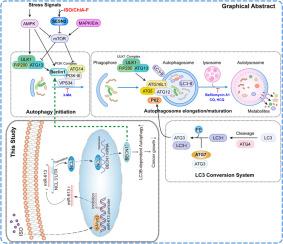ISO-upregulated BECN1 specifically promotes LC3B-dependent autophagy and anticancer activity in invasive bladder cancer
IF 5
2区 医学
Q2 Medicine
引用次数: 0
Abstract
Isorhapontigenin (ISO), an active compound isolated from the Chinese herb Gnetum Cleistostachyum, exhibited strong preventive and therapeutic effects on bladder cancer (BC) both in vitro and in vivo. Our previous studies revealed that ISO-induced autophagy is crucial for its anti-cancer activity. However, the underlying mechanism remains unclear. Here, we showed that BECN1, an important autophagic protein, was induced by ISO treatment and played crucial roles in ISO-induced late phase of LC3B-dependent, and LC3A-independent autophagy, as well as anti-cancer activity. Downregulation of BECN1 was observed in human BCs and BBN-induced mouse invasive BC tissues, whereas co-treatment with ISO completely reversed BECN1 downregulation in BBN-induced mouse invasive BCs. Consistently, ISO treatment significantly increased BECN1 expression in vitro in a dose- and time-dependent manner. Depletion of BECN1 significantly impaired LC3B-dependent autophagy following ISO treatment, as well as abolished the inhibitory effect of ISO on anchorage-independent growth of human BC cells. Mechanistic studies revealed that BECN1 induction was mediated by ISO downregulation of c-Myc, which resulted in miR-613 reduction, in turn leading to increased NCL translation and further promoting NCL binding to BECN1 mRNA, subsequently stabilizing BECN1 mRNA. In conclusion, our results demonstrate that by activating c-Myc/miR-613/NCL axis, ISO treatment results in BECN1 posttranscriptional upregulation, which specifically initiates LC3B-dependent autophagy and anti-cancer activity. Our findings further strengths our application of ISO for therapy of high-grade invasive BC (HGIBC) patients.

ISO上调的BECN1能特异性地促进浸润性膀胱癌中依赖LC3B的自噬和抗癌活性。
从中草药钩藤中分离出来的活性化合物异钩藤甙元(ISO)在体外和体内对膀胱癌(BC)都有很强的预防和治疗作用。我们之前的研究发现,ISO诱导的自噬是其抗癌活性的关键。然而,其潜在机制仍不清楚。在这里,我们发现 ISO 会诱导一种重要的自噬蛋白 BECN1,它在 ISO 诱导的 LC3B 依赖性自噬和 LC3A 非依赖性自噬晚期阶段以及抗癌活性中起着关键作用。在人类BCs和BBN诱导的小鼠浸润性BC组织中观察到了BECN1的下调,而在BBN诱导的小鼠浸润性BCs中,与ISO联合处理可完全逆转BECN1的下调。同样,ISO 处理能以剂量和时间依赖性的方式显著增加 BECN1 在体外的表达。ISO处理后,BECN1的缺失会明显影响LC3B依赖性自噬,并消除ISO对人BC细胞锚定依赖性生长的抑制作用。机理研究发现,BECN1诱导是通过ISO下调c-Myc,导致miR-613减少,进而导致NCL翻译增加,进一步促进NCL与BECN1 mRNA结合,继而稳定BECN1 mRNA。总之,我们的研究结果表明,通过激活 c-Myc/miR-613/NCL 轴,ISO 处理可导致 BECN1 转录后上调,从而特异性地启动 LC3B 依赖性自噬和抗癌活性。我们的发现进一步加强了 ISO 在治疗高级别浸润性 BC(HGIBC)患者中的应用。
本文章由计算机程序翻译,如有差异,请以英文原文为准。
求助全文
约1分钟内获得全文
求助全文
来源期刊

Translational Oncology
ONCOLOGY-
CiteScore
8.40
自引率
2.00%
发文量
314
审稿时长
54 days
期刊介绍:
Translational Oncology publishes the results of novel research investigations which bridge the laboratory and clinical settings including risk assessment, cellular and molecular characterization, prevention, detection, diagnosis and treatment of human cancers with the overall goal of improving the clinical care of oncology patients. Translational Oncology will publish laboratory studies of novel therapeutic interventions as well as clinical trials which evaluate new treatment paradigms for cancer. Peer reviewed manuscript types include Original Reports, Reviews and Editorials.
 求助内容:
求助内容: 应助结果提醒方式:
应助结果提醒方式:


